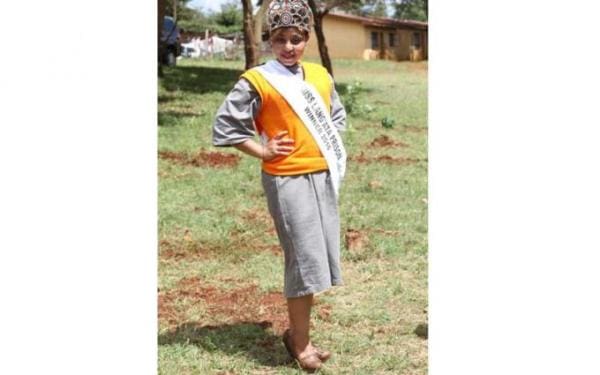
Prison beauty queen Ruth Wanjiku Kamande could easily become the first female post-colonial convict to be hanged.
Her fate now squarely lies in the hands of President Uhuru Kenyatta. Should the Head of State sign her death warrant, then Wanjiku will face the hangman’s noose at Kamiti Maximum Prison, where modern gallows remain unused, thanks to ambiguity in interpretation of the death sentence.
Wanjiku recently joined the list of death row inmates in the country. The 24-year-old was found guilty of killing her boyfriend, Farid Mohammed, in September 2015. Armed with a kitchen knife, she stabbed Mohammed 25 times.
“I want young people to know that it is not cool to kill your boyfriend or girlfriend, even when you feel disappointed or frustrated. Don’t do it!” declared High Court judge Jessie Lesiit while passing the sentence.
The only respite for Wanjiku is that death penalty for murder, violent robbery and treason has never been enforced for the last 30 years. The last execution was in 1987, when coup plotters Hezekiah Ochuka and Pancras Oteyo Okumu were hanged for attempting to overthrow President Daniel arap Moi.
“Successive presidents have either by acts of omission or drawn by human feelings, declined to sign deaths warrants,” observes lawyer Nzamba Kitonga.
Under section 332(3) of the criminal procedure code, a death warrant must be issued and signed by the President for the death to be carried out.
The warrant must state the place and time for execution. The death warrant must also provide directions about the place of burial or cremation of the body of the person to be executed.
Currently, there are about 1,000 death row convicts including Wanjiku. Should Uhuru decide to issue death warrants, then prisons authorities will be forced to find an ‘acting’ hangman since there is none at the moment according to Prisons boss Isaya Osugo.
“We have the gallows, the machines are new and are regularly serviced. We can execute if a death warrant order is signed,” says Osugo.
The death sentence is lawful but not mandatory. Legal experts have often given conflicting interpretation regarding the sentence, while courts continue to condemn offenders to the gallows, where no convict has been killed after Ochuka’s execution.
There is a de facto moratorium of the death penalty, as death row convicts live without knowing what tomorrow holds for them. They perpetually live in fear and anguish, not knowing the day the door to the gallows will be opened.
Nzamba says that as much as he sympathises with aggrieved victims and relatives, a final decision should be made about the death sentence. “Let Parliament make the decision to either abolish or enforce it,” says the lawyer, a former chair of the Committee of Experts on Constitutional Review (CoE) that drafted the 2010 Constitution.
Other offences that attract the death penalty include oath taking, attempted violent robbery and aiding the enemy (applicable especially to military officers).
Criminal lawyer Cliff Ombeta says the inhuman sentence should be stopped, terming the death penalty as unfair and gross violation of human rights.
The penalty was introduced in Kenya by British colonists in 1893. It was uncommon in pre-colonial communities, which placed high value on human life. Most of the documented executions were carried out by the colonial government out to crush the Mau Mau uprising.
Faced with the dilemma of a high number of death row convicts rotting in jails across the country, the government has occasionally commuted death sentences to life imprisonments.
President Mwai Kibaki in 2003 commuted the death sentence of 223 convicts to life imprisonment. He repeated the same act in 2009 by commuting death sentences of more than 4,000 death row inmates.
While commuting the sentences, the President observed that extended stay on death row causes undue mental anguish and suffering, psychological trauma, anxiety and constitutes inhuman treatment.
Rosemary Mathenge, a psychologist, says death row convicts require thorough counselling in order to adjust to their new life in prison.
“They are people who need help to restore their hope, not condemnation. They have a lot of anxiety as they wonder what will happen to them. The environment is depressing to them and that’s why they need counseling,” she adds.
President Uhuru in 2016 commuted the death sentences of all the 2,747 convicts to life imprisonment. They included 2,655 men and 92 women. But two years down the line, the jails are once again filled with death row convicts -now standing at slightly above 1,000, according to Osugo.
The Prisons boss says the unpredictable situation is beyond their control. “As long as the police and courts do their work, we have no other obligation other than that of confining them in our facilities in accordance with the tenets of the law,” explains Osugo.
Chapter Four of the Constitution on the Bill of Rights entitles any accused person the right to a fair trial, including the right to petition the High Court for a new trial while taking into consideration the rights and fundamental freedoms of individuals.
Meanwhile, debate is raging locally about the prudence of the death penalty, which has been abolished in several countries across the world.
In Africa, 20 member states of the African Union (AU) had by July last year abolished the death penalty, while 18 states apply a de facto moratorium. Sixteen states on the continent still uphold the death penalty
In 2016, the Power of Mercy Advisory Committee (POMAC), in conjunction with the Kenya National Commission on Human Rights (KNCHR) and the National Crime Research Centre (NCRC) conducted a national public debate on the death penalty.
The objectives of the nationwide debate were to, among other things, collect views from Kenyans regarding capital punishment, the form of punishment capital offenders should be subjected to, and recommend measures of alternative punishment to offenders.
The main factors contributing to capital offences were found to be poverty/high cost of living (reported by 38.10 per cent of members of public and 42.7 per cent of public officials); drug abuse/alcoholism (27.50 per cent of members of public and 28.6 per cent of public officials) and unemployment (23.7 per cent of members of public and 15.4 per cent of public officials).
In gauging the perceptions on retention or abolition of capital punishment in Kenya, a total of 4,703 members of public were asked to abstractly indicate if they were in favour, or otherwise, of the death penalty as currently legislated.
A majority (56.9 per cent) of the respondents of the general public did not favour the death sentence, while 43.1 per cent supported its retention. Further, responses from public officials working within the criminal justice system returned a finding of 53.9 per cent in support of retention of death sentence, while 46.1 per cent were against it.
Following the ruling of December 17, 2017 by the Supreme Court that mandatory death sentence was unconstitutional, the Taskforce on the Implementation of the Supreme Court Ruling was constituted to receive submissions from the public regarding the ruling.
The taskforce secretariat chaired by Secretary of Justice and Constitutional Affairs, Maryann Njau-Kimani, was expected to hold stakeholder consultation forums, sensitise the public in different parts of the country before submitting recommendations to the Attorney General within of eight months.
Supreme Court judges Chief justice David Maraga, Deputy CJ Philomena Mwilu, justices Jackton Ojwang’, Smokin Wanjala, Njoki Ndung’u and Isaac Lenaola, while calling for the review of the death penalty, had directed re-hearing of the cases of Francis Karioko Muruatetu and Wilson Thirimbi Mwangi at the High Court.
The apex court argued that it is during mitigation that the offender’s version of events may be heavy with pathos necessitating the court to consider an aspect that may have been unclear during the trial process.
Source-sde.co.ke
No Catwalk: Life On Death Row Is Hell On Earth-Ruth Kamande









